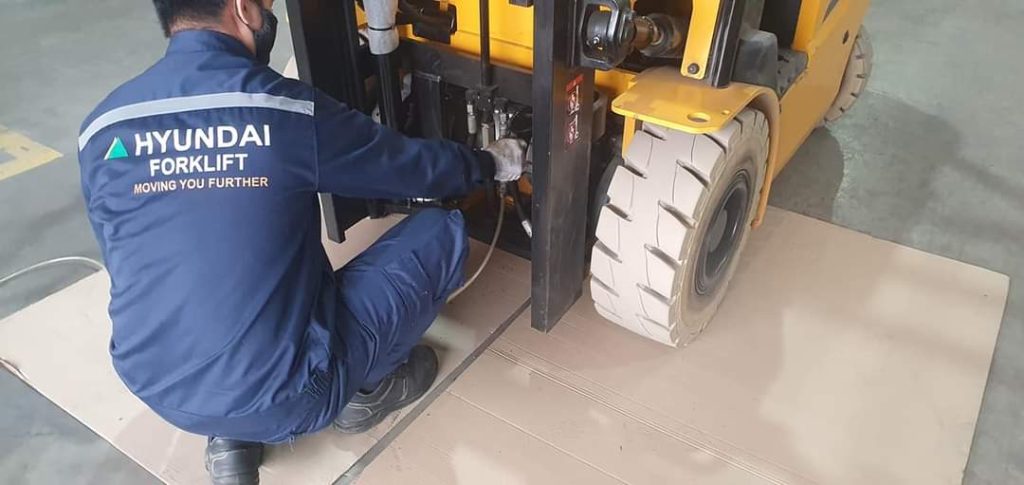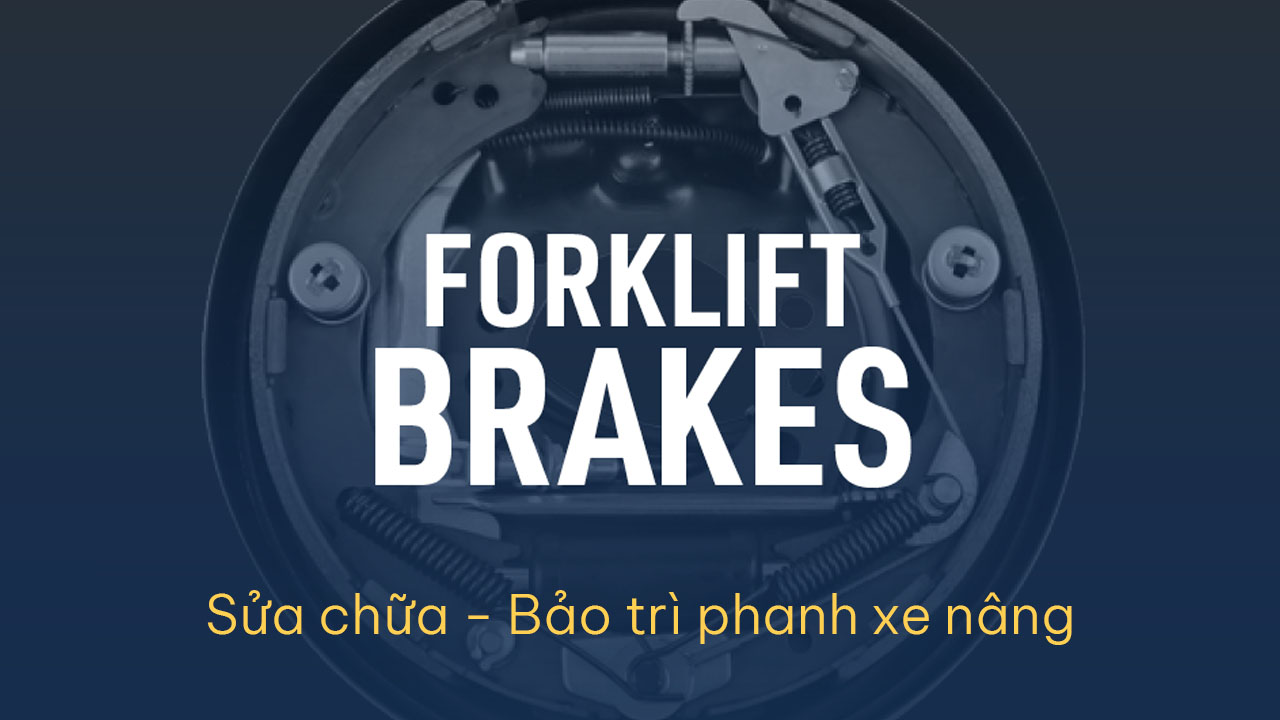Forklift brakes are an essential safety feature that helps to prevent accidents and injuries. They are responsible for slowing down or stopping a forklift, which is important for maintaining control in a variety of situations, including when loading and unloading, maneuvering in tight spaces, and backing up.
What is a forklift brake?
Forklift brakes are one of the most important safety features on a forklift. They are responsible for slowing down or stopping the forklift, which is essential for preventing accidents and injuries. Brake failure on a forklift can have disastrous consequences, resulting in serious injuries or even death to operators, pedestrians, and other workers in the area.
That’s why it is so important to maintain forklift brakes regularly and professionally. Regular maintenance can help to identify and fix potential problems before they lead to brake failure. This can save you money in the long run, as well as protect your employees and others from harm.
Here are some of the benefits of regular forklift brake maintenance:
- Improved safety: Regular brake maintenance can help to ensure that your forklift brakes are working properly and can stop the forklift quickly and safely. This can help to prevent accidents and injuries.
- Reduced downtime: Brake failure can lead to costly downtime for your forklift. Regular maintenance can help to prevent brake failure and keep your forklift running smoothly.
- Extended brake life: Regular maintenance can help to extend the life of your forklift brakes. This can save you money in the long run, as you will not need to replace your brakes as often.
- Improved performance: Regular maintenance can help to improve the performance of your forklift brakes. This can make your forklift easier to operate and more efficient.
If you are not sure how to maintain your forklift brakes, it is important to consult with a qualified technician. They can inspect your brakes and recommend any necessary maintenance or repairs.
Here are some tips for identifying and troubleshooting forklift brake problems:
- Look for signs of wear and tear: Inspect your forklift brakes regularly for signs of wear and tear, such as worn brake shoes, cracked or warped brake drums, and leaky brake lines.
- Listen for unusual noises: If you hear any unusual noises when applying the brakes, such as squealing, grinding, or clunking, this could be a sign of a problem.
- Test the brakes: Test your forklift brakes regularly to make sure they are working properly. To do this, apply the brakes lightly while driving slowly in a safe area. The brakes should engage smoothly and stop the forklift quickly and safely.
To learn more about our forklift brake maintenance and repair services, or to schedule an appointment, please call us today at 093 208 1688.
What are the different types of forklift brakes?
There are two main types of forklift brakes: drum brakes and disc brakes:
- Drum brakes: This is the most common type of brake on forklifts. Drum brakes consist of a rotating drum and a pair of brake shoes. When the brake is applied, the brake shoes press against the drum, creating friction to slow down or stop the vehicle.
- Disc brakes: This type of brake is less common than drum brakes, but it is becoming more popular due to its higher performance and safety. Disc brakes consist of a rotating disc and a pair of brake pads. When the brake is applied, the brake pads press against the disc, creating friction to slow down or stop the vehicle. This is a safe braking system commonly used on forklifts Hyundai, Crown, etc.
In addition, forklift brakes can be classified according to the transmission method:
- Mechanical brakes: This type of brake uses mechanical force to transmit force from the brake pedal to the brake shoes.
- Hydraulic brakes: This type of brake uses hydraulic fluid to transmit force from the brake pedal to the brake shoes.
- Air brakes: This type of brake uses compressed air to transmit force from the brake pedal to the brake shoes.
Forklift brakes are an important part of forklifts, ensuring the safety of operators and goods. The choice of the right type of brake for a forklift depends on many factors, including load capacity, working environment, and budget.
Troubleshooting and maintenance of forklift brakes
The most common reasons why forklift brakes fail early include:
- Driving with one foot on the brake: This can cause the brake shoes to overheat and wear out prematurely.
- Forgetting to release the parking brake: This can also cause the brake shoes to overheat and wear out prematurely.
- Hard braking without giving the vehicle time to decelerate: This can put excessive stress on the brake system, leading to premature failure.
- Damage to the center bearing or wheel cylinder, causing the brake shoes and drum to become contaminated with oil: Oil can contaminate the brake shoes and drum, making it difficult for the brakes to engage properly. This can lead to decreased stopping power and premature brake failure.
In addition to the above, other factors that can contribute to early forklift brake failure include:
- Poor maintenance: Forklift brakes should be inspected and maintained regularly to ensure that they are in good working order. This includes checking the brake fluid level, inspecting the brake shoes and drums for wear and tear, and lubricating the brake components.
- Overloading the forklift: Overloading the forklift can put excessive stress on the brake system, leading to premature failure.
- Operating the forklift in harsh environments: Operating the forklift in harsh environments, such as dusty or wet conditions, can also contribute to early brake failure.
To avoid premature forklift brake failure, it is important to follow the manufacturer’s operating and maintenance instructions. It is also important to train forklift operators on how to operate the forklift safely and properly.
Here are some tips for extending the life of your forklift brakes:
- Avoid driving with one foot on the brake.
- Always release the parking brake before driving.
- Brake smoothly and gradually.
- Have your forklift brakes inspected and maintained regularly by a qualified technician.
- Do not overload the forklift.
- Avoid operating the forklift in harsh environments.
By following these tips, you can help to ensure that your forklift brakes last longer and perform safely.
Common problems with forklift brakes
- Brakes not engaging: This is the most common problem with forklift brakes. The cause may be worn brake shoes, brake fluid leaks, or a faulty wheel cylinder.
- Brakes squealing: The cause may be worn brake shoes, contaminated brake shoes, or worn or damaged brake components.
- Brakes vibrating: The cause may be worn brake shoes that are not worn evenly, or misaligned brake components.
- Brakes binding: The cause may be worn brake shoes that are too close to the drum, or a faulty wheel cylinder.
How to troubleshoot forklift brake problems
- Check the brake shoes to see if they are worn beyond the wear limit. If the brake shoes are worn beyond the wear limit, they need to be replaced.
- Check the brake fluid for leaks. If the brake fluid is leaking, the leak needs to be repaired.
- Check the wheel cylinder for damage. If the wheel cylinder is damaged, it needs to be replaced.
Forklift brake maintenance
Forklift brake inspection should be a regular part of your operation. Most experts recommend a thorough brake inspection every 2,000 hours of operation. Click here for a complete guide on how to perform a brake inspection.
This includes checking your forklift parking brake. Often overlooked, the forklift parking brake is incredibly important. Plus, since it is engaged every single time the equipment is parked, it needs to be inspected just as often as the foot brakes.
Remember that how you use your equipment will affect its condition and performance. Driving with the forklift parking brake engaged can cause serious damage to the equipment. Make sure the forklift parking brake is disengaged before each use.
Also, never drive “two-footed” or brake hard without giving the equipment time to decelerate.
Take care of your machine and schedule routine maintenance every 2,000 hours. It is also a good idea to blow out brake dust every 250 hours. Remember that you will probably need to replace
When to replace
It is not difficult to tell when to replace forklift brakes. Like other vehicles, worn brakes will make unusual noises when braking. Operators may also find that the equipment is not stopping as quickly as before.
Therefore, it is up to the operator’s diligence to identify when to replace forklift brakes. Each pre-operation inspection includes checking the foot brakes and forklift parking brakes. Make sure the operator is performing this check correctly and not wearing headphones while driving so they can hear any noises.
As mentioned before, your forklift brakes should be included in your preventive maintenance plan. Most experts recommend preventive maintenance every 90 days in addition to daily pre-operation checks.
Since brakes are a wear item, the time you replace them depends entirely on how often and how they are used.
To operate, forklift brake shoes press against the brake drum, causing the machine to stop. Forklift brake shoes have an outer lining that wears over time due to friction when pressed against the brake drum.
If this lining wears out and the ridges on the forklift brake shoes damage the brake drum, you will need to replace the entire brake system. This usually occurs after 5,000 hours of use.
Note that the recommended inspection interval for brakes is every 2,000 hours. If you follow these guidelines, you will be able to replace the forklift brake shoes before they damage the brake drum and lead to costly repairs.
How much does forklift brake repair cost?
The cost of forklift brake repair typically ranges from a few hundred thousand to a few million dong, depending on the extent of the damage to the brakes.
The types of forklift brake repair costs include:
- Brake shoe replacement: This is the most common type of forklift brake repair cost. The cost of brake shoe replacement typically ranges from 500,000 to 1,000,000 VND/set.
- Brake drum replacement: Brake drums typically wear out over time and need to be replaced after every 5,000 to 7,000 hours of use. The cost of brake drum replacement typically ranges from 2,000,000 to 3,000,000 VND/drum.
- Wheel cylinder repair: Wheel cylinders can be damaged by impact or prolonged use. The cost of wheel cylinder repair typically ranges from 1,000,000 to 2,000,000 VND/cylinder.
- Repair of other brake system components: Other brake system components, such as brake cables, brake clutches, may be damaged and need to be repaired or replaced. The cost of repairing or replacing these components typically ranges from a few hundred thousand to a few million dong.
The cost of repair or replacement also depends on the repair facility, the skill level of the technician, and the condition of the forklift. Here are some factors that affect the cost of repairing and replacing your forklift brakes.
- Type of forklift: The cost of repairing and replacing forklift brakes depends on the type of forklift. Larger forklifts are more expensive to repair and replace brakes than smaller forklifts.
- Type of brake: Drum brakes are less expensive to repair and replace than disc brakes.
- Severity of damage: The cost of repairing and replacing forklift brakes is higher if the damage is severe.
To reduce the cost of repairing forklift brakes, you should maintain your forklift brakes regularly. Regular maintenance will help to identify and repair any problems before they cause costly repairs. It is also a good idea to blow out brake dust every 250 hours.
Our Hyundai Forklift and Crown forklift,… solutions with modern, smooth, low-maintenance wet disc braking systems are a great choice for your business. Contact us for a consultation and to find the best solution for your business.
|
